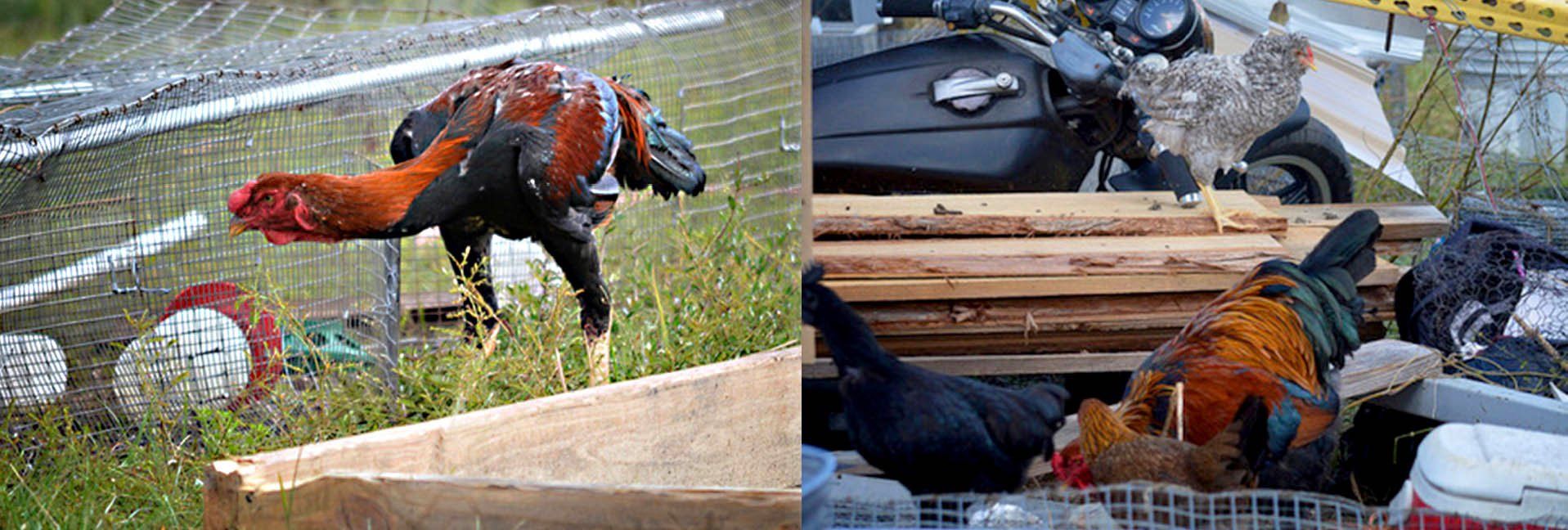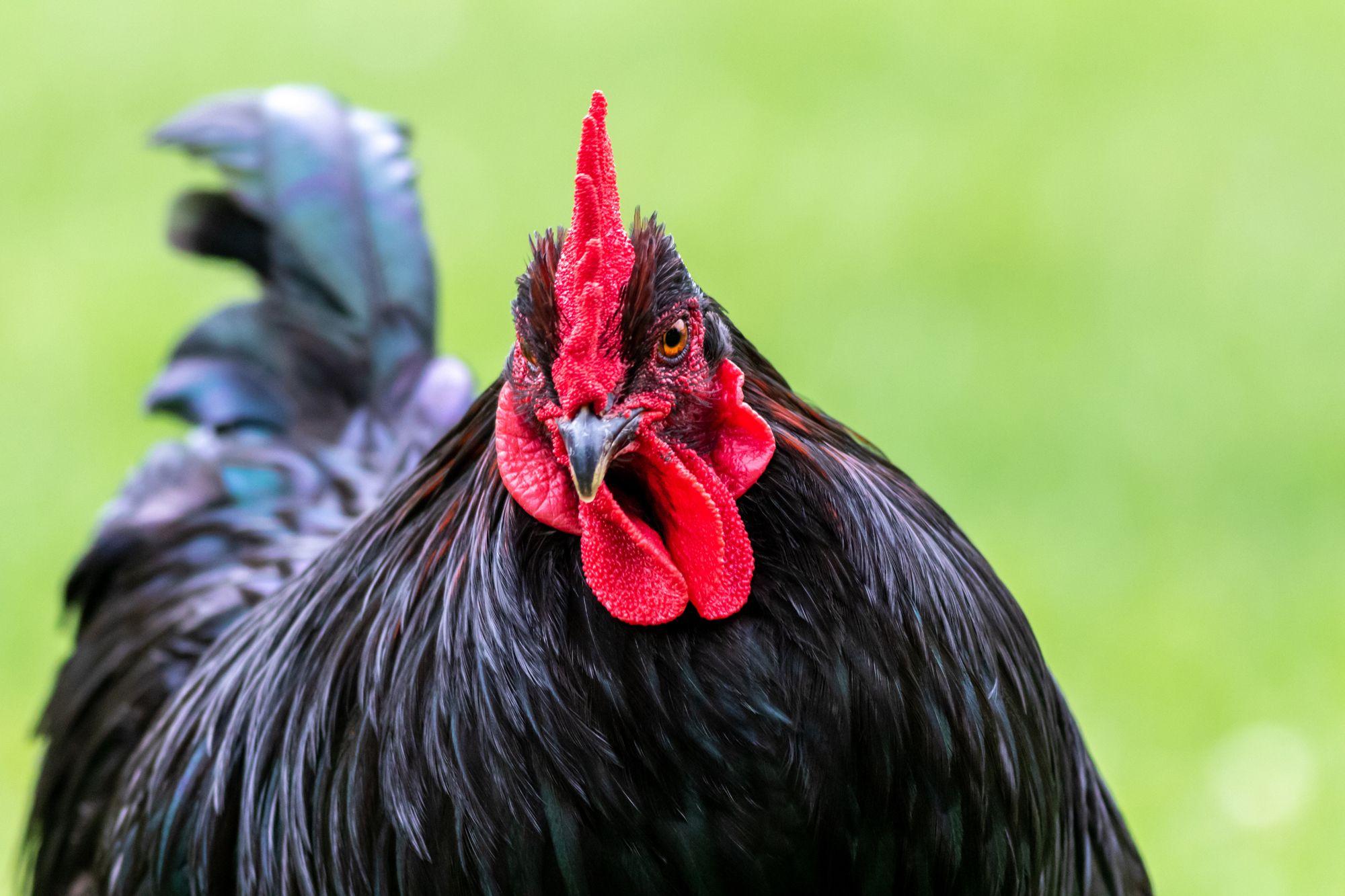Surviving Hurricane Michael


Trust your gut and anticipate the worst
My name is Carrie Boyer, I live in Altha, Fla., I am a participant in the USDA National Poultry Improvement Plan and I raise lavender Old English Game Bantams.
On October 10th, 2018 our house took a direct hit from Hurricane Michael.
I’ve been through hurricanes and tropical storms before, and have prepped countless times for storms which ended up going in a different direction. Hurricane Michael was different—it was a fast moving, fast developing storm, leaving little time for evacuation especially for those with livestock. Nobody anticipated this storm would strengthen to the point where it had Category 5 characteristics, 170 mph winds recorded at Tyndall AFB in Panama City, when it made landfall.
Should I stay or should I go?
One of the most challenging decisions to make when it comes to storms is—do I evacuate or not? Deciding is especially difficult for those who own livestock, like poultry for example. Should I stay or should I go? What would happen to my birds while I was away? What would happen to them if roads were blocked at I couldn’t access them for several days?
The factors I took into consideration into making the decision to stay were:
I live in a zone 2 manufactured house constructed to withstand 100 mph sustained winds, and the house is tied down every 4 feet.
I do not live in a storm surge area so the most I would have to worry about are winds and tornadoes that hurricanes can produce.
Little did I know Hurricane Michael would be like a 150 mile tornado. The agricultural damage from the hurricane is forecast to be 1.3 billion dollars, with damages to commodities such as cotton, pecans, timber, and chickens. In Georgia, a broiler chicken production state, roughly 100 chicken houses and over two million chickens were destroyed by the storm.
Don’t waste prep time
I own approximately 75 chickens as a backyard poultry breeder. In preparation for the storm, the day before it rolled in I cleaned and topped off every single waterer. I made a trip to the feed store and purchased extra bags of feed. Basic emergency guidelines for human survival when disaster strikes is to have at least three days of food and water at minimum on hand. The same concept should apply to your poultry and any other animals you may own.
I took inventory of my water storage. I filled up extra gallon water jugs, five-gallon buckets, and filled my gigantic bathtub with water—I had enough to last me and my birds 10 days. I pulled out every cage carrier I own and brought my birds inside the house when they went to roost the night before the storm.
I had no intention of going outside to “check on the birds” and placing myself in any further danger.
While I feel my pens are built well, anchored down with 4x4 posts into the ground, my biggest concern was falling trees onto the pens and crushing them. Indeed, one tree did uproot and lean over on a pen during the storm, which caused me to lose access to two pens until the branches were cleared so I could open the doors.
The storm and aftermath
The morning of the storm, I occupied my time waiting for The Big One to hit, inspecting birds. This helped keep me calm and focused.
I was trimming toenails on a hen when the power went out. And then began the sound of the freight train, a common sound associated with tornadoes. This sound lasted for four straight hours because of the 100+ mph winds. We did get a 15-minute break in the wind when the eye went over our house.
As I write this, we have gone a full two weeks without electricity due to widespread damages from this storm. The power and communications grid took a serious blow and severely compromised the infrastructure. While landline telephone use is out, my DSL provider has generators set up at substations so the internet lines remain on to help people keep in contact with the outside world. A lucky few are able to power up their home internet modems with the use of a generator, as well.
How to keep clean?
Tending to a flock of 75 chickens after a catastrophe is a frightening and challenging ordeal. The biggest challenge? You can’t run a water well without electric power or without a hand water pump. Having neither, I began hauling in fresh water daily for the birds when my supply ran out.
Without running water, the personal cleanliness factor when raising poultry means you just don’t get as clean as you’d like to be. I am a frequent hand washer, so I have been using the bathtub water in dishpans set up as handwashing stations. After a full day of handling poultry and poultry products, the water gets dirty quickly.
As a result, I have resorted to getting more creative in preventing the spread of germs like salmonella with the use of antibacterial wipes, slathering on the hand sanitizer, and using a lot more paper towels. Fortunately, these supplies are distributed in large quantities for free with hurricane relief supplies.
Who’s your ‘frenemy?’
Glorious trees! They can be your best friend to provide cooling shade for you and your birds during hot summers, they can protect and provide a buffer from high winds as such happened with my home, but they can also be destructive and deadly during storms. I had the opportunity to visit a few poultry friends after the storms and inspect what happened with their birds.
At one farm, Apex Farms Equestrian Center in Youngstown Fla., they are surrounded by trees. While the trees did provide a buffer from the winds, several uprooted and damaged the horse pasture fencing, Their chicken coop ,which is placed between their house and a large heavy metal shipping container, suffered no damage and all the chicken survived.
The stress of the storm and changes to their surroundings caused the birds to stop laying.
Another farm, Rockin’ It Farms in Marianna, Fla., suffered more. The lack of trees from tree-farming deforestation next door earlier in the year caused the winds to get exceedingly high. There was severe damage sustained to coops and a pole shed—six-by-six wooden support beams were snapped in half by the high winds, and roofing was crumpled like tin foil. Coops were flipped, bent, broken, and birds got loose.
My friend suffered substantial severe flock loss: Approximately 200 birds were either hit by flying debris, or trapped under debris.
In some cases, the wind was so harsh that it peeled the feathers off the birds, killing them.
Let the birds cope on their own?
No one anticipated that Hurricane Michael would be such a monstrously destructive storm on such a massive scale. From a poultry-related standpoint, after having inspected several farms after this storm, I have to vehemently disagree with suggestions made by people on blogs and forums advocating to “turn your birds loose before the storm they’ll be safer.”
My opinion—my suggestion—for anyone who is unsure of their coop construction and its ability to withstand a storm, and the potential risks involved for your birds to be hit/maimed/killed by flying debris if they were turned loose to roam freely during the storm, is to do as I did: Bring them inside in pet carrier cages for the duration of the storm. IT IS OKAY TO DO SO!
It’s okay to be worried about your chickens! It’s okay if you feel the need to take any means necessary to protect them. After, all, they depend on you! I did, and my birds happily laid eggs through the storm and have continued to lay eggs every day since!
History made, and a short shopping list
Hurricane Michael was a history-making storm. It may never happen again to me here, but it may happen to someone else. In the end, while the electric power has not been restored yet, I have learned a valuable lesson:
Trust your gut instinct in caring for your chickens they will help you get through the dark moments in the days following the storm .
Oh, and invest in a generator equipped to run the water well.
Tags:Hot Topics

Chicken Whisperer is part of the Catalyst Communications Network publication family.










